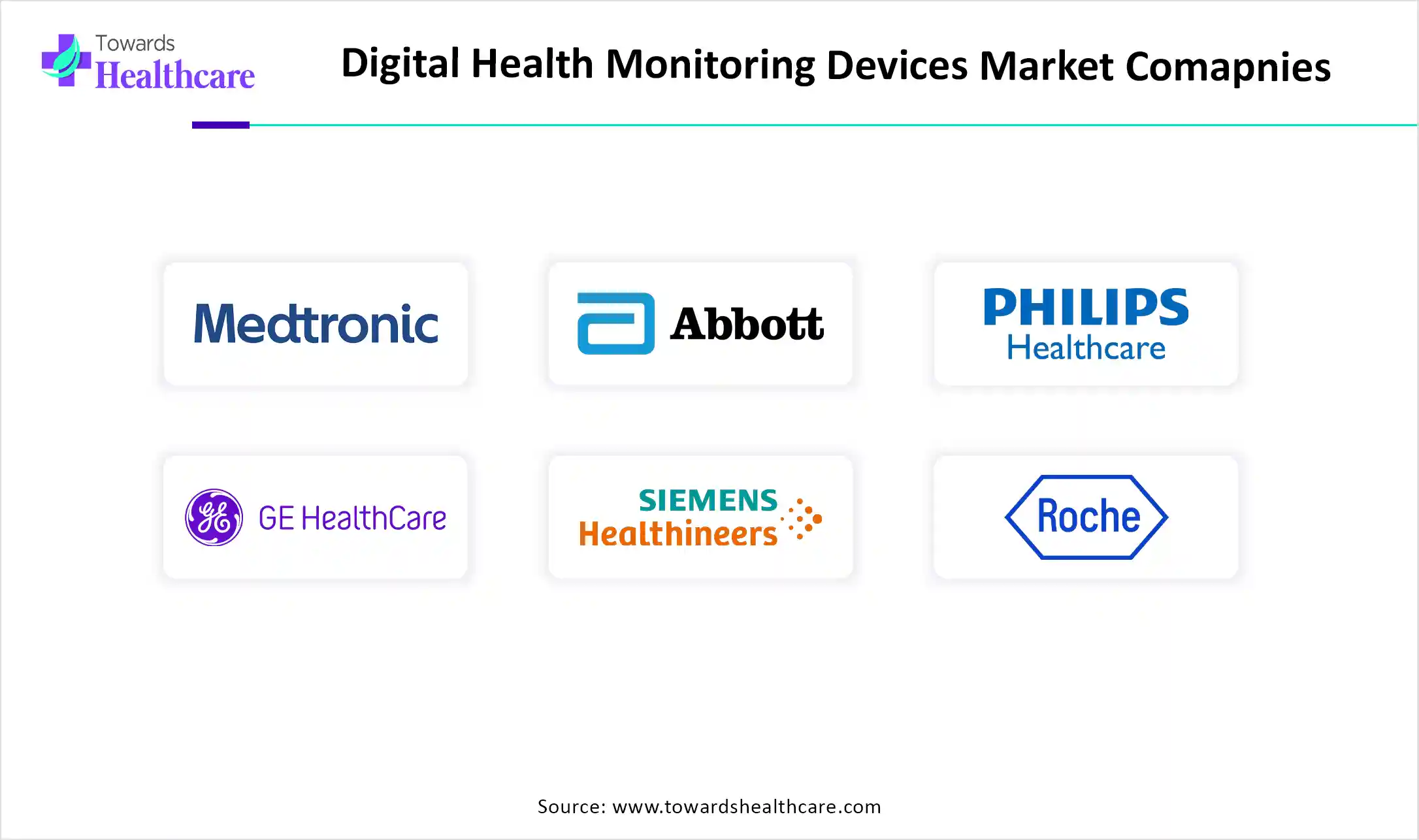Top Companies in the Digital Health Monitoring Devices Market

- Medtronic
- Abbott Laboratories
- Philips Healthcare
- GE Healthcare
- Siemens Healthineers
- Roche Diagnostics
- Johnson & Johnson
- Boston Scientific
- ResMed
- Masimo
- Dexcom
- Omron Healthcare
- iRhythm Technologies
- BioTelemetry (now part of Philips)
- Withings
- Fitbit (Google)
- Apple
- Garmin
- Huawei Health / Huawei Technologies
- Xiaomi (Huami / Amazfit)
Market Forecast
The global digital health monitoring devices market size reached US$ 5.23 billion in 2024 and is anticipate to increase to US$ 6.22 billion in 2025. By 2034, the market is forecasted to achieve a value of around US$ 29.71 billion, growing at a CAGR of 18.9%.
Digital Health Monitoring Devices Market Trends
Adoption of Inorganic Growth Strategies –Inorganic strategies like mergers, acquisitions, and partnerships enable digital health device companies to expand geographically, enhance technology and product portfolios, accelerate R&D, achieve cost efficiencies, strengthen competitiveness, and access larger patient data. These moves drive faster innovation and broader market reach.
- In March 2025, ATA Action, the advocacy arm of the American Telemedicine Association (ATA), acquired the Digital Therapeutics Alliance (DTA). DTA is the leading international organization focused on expanding access to digital therapeutics. The combined organization creates a strong platform for policy and advocacy, focused on advancing innovative technologies that are transforming patient care.
Funding & Technology Advancements- Funding and technology boost innovation, device accuracy, AI integration, and adoption, driving growth in digital health monitoring devices.
- In September 2025, Melbourne-based startup Nutromics developed a groundbreaking "lab-on-a-patch" wearable device capable of monitoring hundreds of biomarkers through DNA-based biosensors. The company has raised US$60 million in funding, including US$7.5 million from Dexcom. The patch aims to revolutionize medical diagnostics by enabling real-time monitoring of critical conditions like sepsis and providing insights into antibiotic dosing. Clinical trials began with a world-first ICU study completed in 2024, and Nutromics is seeking FDA approval by 2028.
Value Chain Analysis
R&D
Key Activities:
- Conceptualization & Design: Identifying unmet healthcare needs and designing devices that address specific health parameters.
- Prototyping & Testing: Developing prototypes and conducting initial tests to ensure functionality and reliability.
- Integration of Technologies: Incorporating sensors, connectivity features, and software applications to enhance device capabilities.
Key Organizations Involved:
- Technology Companies: Apple, Samsung, and Fitbit lead in integrating health monitoring features into consumer devices.
- Medical Device Manufacturers: Companies like Medtronic, Abbott Laboratories, Philips Healthcare, and GE Healthcare focus on developing specialized health monitoring devices.
- Research Institutions: Universities and research centers collaborate on developing innovative health technologies.
Clinical Trials & Approval
Key Activities:
- Preclinical Studies: Conducting laboratory and animal studies to assess device safety and efficacy.
- Clinical Trials: Implementing human trials to gather data on device performance and patient outcomes.
- Regulatory Submissions: Preparing and submitting documentation to regulatory bodies for approval.
Key Organizations Involved:
- Regulatory Bodies: The U.S. Food and Drug Administration (FDA) and the European Medicines Agency (EMA) oversee device approvals.
- Clinical Research Organizations (CROs): Organizations like Parexel and Covance manage and conduct clinical trials.
- Healthcare Providers: Hospitals and clinics participate in clinical trials to evaluate device effectiveness.
Patient Support and Services
Key Activities:
- Training and Education: Providing users with information on device usage and health management.
- Customer Support: Offering assistance with device setup, troubleshooting, and maintenance.
- Data Management: Ensuring secure handling and analysis of health data collected by devices.
Key Organizations Involved:
- Healthcare Providers: Doctors and nurses offer guidance on integrating devices into patient care plans.
- Insurance Companies: Some insurers provide coverage for digital health devices and related services.
- Technology Support Teams: Companies like Apple and Fitbit offer customer service for device-related inquiries.
Latest Announcement by Industry Leaders
In May 2025, Ketan Mehta of Apnimed highlighted that gathering minimal sleep data over an extended period is more valuable than extensive data from a single night, contrasting with traditional in-lab polysomnography. He emphasized that longitudinal data, showing trends and night-to-night variations, provides a more accurate picture of sleep quality and treatment response than a large amount of data from a short, isolated event. This approach can offer insights into patterns that a single, intensive study might miss.
Recent Developments in the Digital Health Monitoring Devices Market
- In October 2024, Finnish company Oura introduced the Smart Ring 4, enhancing its capabilities in tracking health metrics such as heart rate, blood oxygen levels, and body temperature. The company has sold over 2.5 million units since its inception in 2015 and remains a market leader in the smart ring category. Oura recently raised US$200 million in funding, valuing the company at US$5.2 billion, and plans to expand into new markets, including Australia, Japan, and the Middle East.
- In June 2025, Cardinal Health, a healthcare company, revealed the introduction of the single-patient use monitoring cable and lead wire system, which allows the continuous monitoring of blood oxygen level, cardiac activity, and temperature with one point of connection.
Become a valued research partner with us, please feel free to contact us at sales@towardshealthcare.com
Keypoints
- Company Overview
- Locations Subsidiaries/Geographic reach
- Key Executives
- Company Financials
- Patents registered
- SWOT Analysis
- Applications Catered
- Strategic collaborations
- Recent Developments
- Competitive Benchmarking
